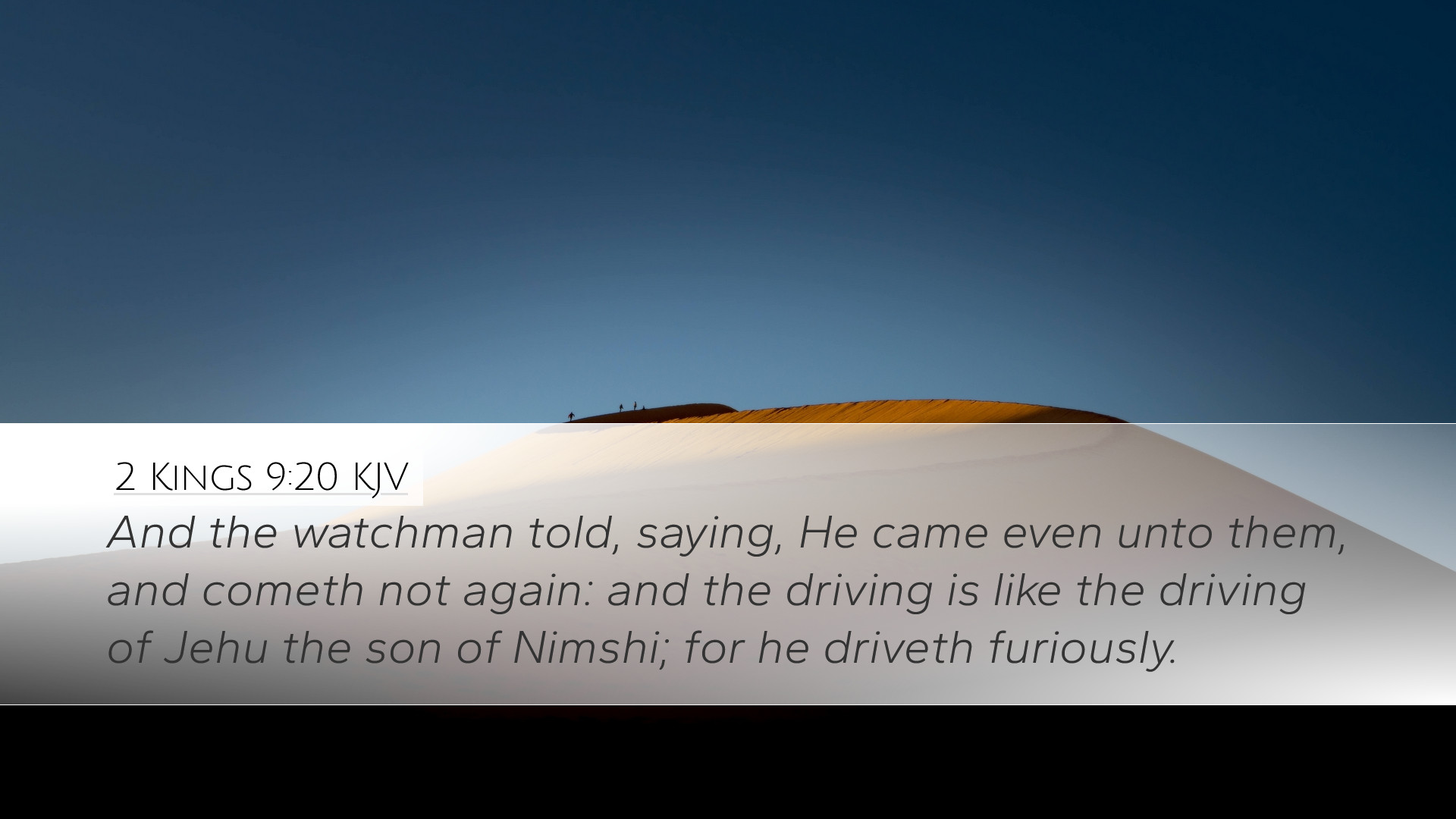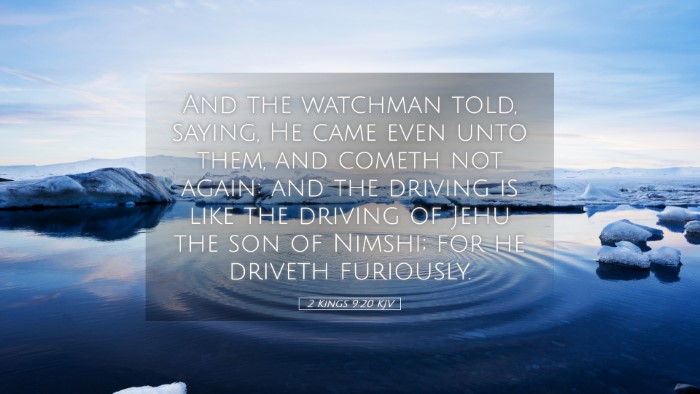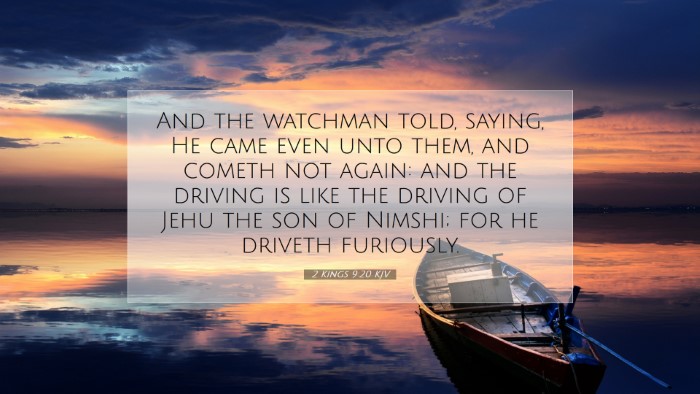Commentary on 2 Kings 9:20
Verse Context: 2 Kings 9:20 states: "The watchman reported, 'The messenger has come to them, but he isn’t coming back.' So he must be riding the chariot of Jehu son of Nimshi, for he is driving like a madman.'" This verse comes during a critical juncture in the prophetic ministry and the transition of Israel’s monarchy. Jehu is being anointed to rid Israel of the house of Ahab, and this prophetic message through the watchman acts as a prelude to a significant historical and theological shift.
Commentary Insights
This commentary draws upon insights from several public domain sources, offering a comprehensive understanding of the significance of this verse.
Matthew Henry's Commentary
According to Matthew Henry, this verse captures the urgency and fervency of Jehu’s mission. Henry stresses that Jehu’s driving like a madman symbolizes a divine zeal and determination; he is propelled by God’s anointing, which compels him to act swiftly against the immorality and idolatry that has permeated Israel due to Ahab’s and Jezebel's reign.
- Divine Urgency: Just as the messenger does not return, indicating he has been sent with a divine purpose, so too Jehu is called to deliver God's judgment. Henry notes that this reflects how seriously God takes the covenant relationship with Israel and the need for retribution against sin.
- Symbol of Madness: The descriptor "madman" is not a mere slip but a reflection of how God’s anointed often appear to the world. Their madness is rooted in the radical obedience to God’s calling, a theme prevalent in biblical history where the truly faithful often seem irrational to worldly standards.
Albert Barnes' Notes on the Bible
Albert Barnes expands on the idea of the watchman’s role in this narrative. A watchman is critical for the safety of the city, providing early warning of threats. The watchman's observation that Jehu's chariot is distinctive is significant in understanding the prophetic importance of discerning God’s messengers.
- Watchman’s Perception: Barnes notes the importance of perception in leadership and spiritual discernment. The watchman, through his experience, recognizes Jehu’s unique driving style, a metaphor for recognizing genuine anointings in ministry today. This calls for sensitivity to the Holy Spirit's leading.
- Role of the Messenger: The messenger being sent with a specific mission mirrors the ongoing theme in Scripture where God sends prophets to call His people back to covenant faithfulness. Here, Jehu's leadership is immediate and direct, showcasing God's imperative need for swift action against corruption.
Adam Clarke's Commentary
Adam Clarke provides a meticulous examination of the historical and geographical context surrounding Jehu's ascendancy. He emphasizes that Jehu's emergence is not merely about political power but divine intervention aimed at correction and restoration of Israel.
- Corrective Leadership: Clarke posits that Jehu is an archetype of corrective leadership, appointed by God to purge the land of its apostasy. His 'mad driving' symbolizes not just enthusiasm but also commitment to God's standards and fidelity to His ways.
- Historical Importance: The time period and the societal conditions leading up to these events serve as a backdrop for understanding God’s long-suffering nature and His ultimate justice. Clarke’s insights here underscore the balance between God’s mercy and judgment.
Theological Implications
The intersection of the messenger, the watchman, and Jehu himself sets a precedent for understanding divine authority and kingdom dynamics. The urgency in Jehu's mission reflects the seriousness of sin and the immediate call for repentance.
- God’s Sovereignty: This passage illustrates God's sovereignty in history. Even in times of turmoil, God raises leaders who fulfill His prophetic plans. Jehu’s swift approach contrasts the lethargy often seen in leadership that ignores God’s voice.
- Role of Prophecy: Prophets like the unnamed messenger and watchman reveal how God communicates His intentions to His people and the responsibility of the leaders to act upon these revelations. The church today must discern and heed similar warnings in our context.
- Community Responsibility: This text not only signifies individual responsiveness to God’s call but also a collective responsibility of communities to stand against evil and promote righteousness.
Practical Applications
For pastors, students, theologians, and Bible scholars, the interpretation of 2 Kings 9:20 provides a wealth of applications:
- Awareness of God’s Call: All are invited to cultivate an awareness of God’s call in their lives and the lives of those around them, much like the watchman who was attuned to the signs of Jehu's approach.
- Embrace the Challenge: Emulating Jehu’s zeal means embracing the challenges of leadership in the face of adversity and moral decay in society, not shying away but confronting it with prayerful conviction.
- Discerning Leadership: Evaluate the qualities of leaders in your midst based on their faithfulness to God’s calling and their ability to discern and act upon God’s directives, as seen through Jehu's actions.
Conclusion
In summary, 2 Kings 9:20 is rich in meaning, highlighting themes of divine urgency, the essential role of discernment, and the impact of faithful prophetic leadership. The insights combined from Matthew Henry, Albert Barnes, and Adam Clarke remind us of our continued invitation to seek God’s anointing and to willingly engage with the challenges that faithfulness often brings.


